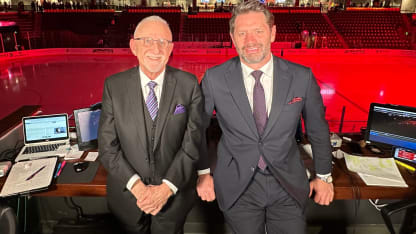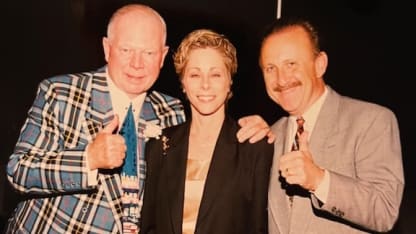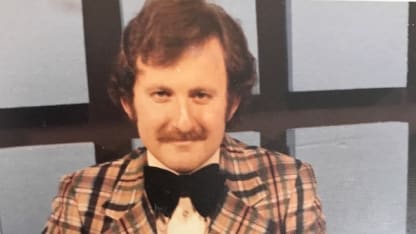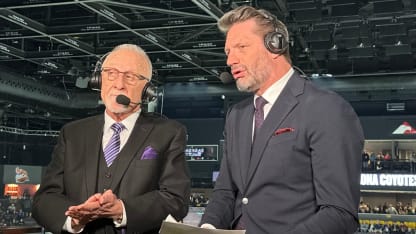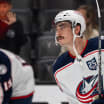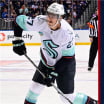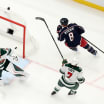Falling for Hockey
Rimer was born in Toronto and like many kids who are from Canada fell in love with the sport of hockey.
The Maple Leafs quickly became his passion in life, and Rimer was never afraid to try to get close to the game even in his early years.
“All I cared about was hockey, and in particular Frank Mahovlich,” he said of the Leafs’ six-time Stanley Cup winner and Hockey Hall of Famer. “My bedroom was plastered with pictures of him. And as a young kid, I would take the subway down and wait. I knew where the visiting players would come up from the subway to walk into Maple Leaf Gardens, and I begged them to take me into the rink on a Saturday morning to go into a skate. And a lot of them did.
“I met a lot of players. I met Tim Horton. Sid Abel, a Hall of Fame coach and former NHL player, bought me lunch one day at the Royal York Hotel because I hung around the hotel because I wanted to get autographs before autographs even became fashionable.
“I’m not saying I started the whole autograph trend, but I had Bobby Hull’s autograph on a ticket stub. Where that thing is, I have no idea, but it meant a lot to me.”
While Rimer was living and breathing hockey as a youngster, he had to endure the unfortunate reality that his father passed away before he was a teenager. Eventually, his mother would remarry, and the family moved when Jeff was 14 to Calgary, where a brush with greatness would soon follow.
Rimer walked into his homeroom class the first day at Henry Wise Wood High School and immediately met a friend for life in John Davidson, the current Blue Jackets president of hockey operations. The two shared a love of the sport and hit it off, not knowing they’d each spend decades as fixtures in hockey.
At the time, they were just teenagers who would skip class to skate on the rink that was outside. But while Davidson was blessed with the type of talent that would make him an NHL player by age 20, Rimer didn’t quite have the same abilities.
“He was a guy who loved sports and wanted to play hockey, but it wasn’t in the cards,” Davidson said. “He had a pretty good shot, but his skating wasn’t what it needed to be, so it wasn’t gonna happen. He was smart enough to figure that out and wanted to be in sports, and at a young age he moved into broadcasting.”
Still, Davidson looked out for Rimer, even encouraging him to try to continue playing hockey as long as he could. That came to a close when tryouts were held at the neighborhood rink in southwst Calgary.
“He talked me into trying out for AAA, and he said, ‘The extra ice time will do you good,’” Rimer said. “Of course, my career came to a sudden ending because I was told to leave the ice. Over 200 kids at Rose Kohn Arena, I got tapped and the shoulder and they said, ‘House league starts Monday, kid.’ I was on a snowbank Monday and I said, ‘You know what, this isn’t gonna work.’”
Getting Into Broadcasting
Rimer noted he had cousins who were straight-A students, and Davidson was soon to become the first goalie to go directly from junior hockey to the NHL.
Meanwhile, he admittedly wasn’t a great student, and he had to face the realization that his hockey career wasn’t going to take off, either. But if he had one trait that separated him from his peers, it was his fearlessness.
When he realized the on-ice dream wasn’t going to work out, Rimer turned his focus to broadcasting. As a teenager, he convinced sportscaster Ken Newans to give him a show on high school and college sports; if he couldn’t make it on the ice, he was going to make it on the air.
“There’s the rink rats,” Rimer said. “I was a radio and television rat.”
One of Rimer’s most famous stories came when he was still a teenager and one of the most provocative athletes in the world came to Calgary. Muhammad Ali had been stripped of the heavyweight title because of his refusal to fight in the Vietnam War, and in the early 1970s he appeared in Calgary for an exhibition while trying to get his boxing license back.
A bevy of reporters from across North America descended on the Stampede City, and Rimer put on his best shirt and tie for the event. Without hesitation, he walked up to Ali’s trainer, Angelo Dundee, and asked for an interview with the champ.
The detail he left out was that he didn’t have a camera or a microphone, and the interview would have to take place at a studio a mile away up the Macleod Trail.
“The guy laughed at him and said, ‘Jeff, he’s not gonna do something like that. Don’t be so damn stupid,’” Newans remembers now. “And Ali heard him say that and said, ‘Where is it? Where do we have to go?’ Ali went there somehow, someway, and did an interview.”
Simply put, Rimer had a tenacity others didn’t have, and Newans recognized it immediately.
“He said, ‘You know you’re gonna upset a lot of people because of your aggressiveness,’” Rimer said. “But if I wasn’t aggressive – how many 19-year-olds do you know who would go to a major press conference with television cameras and personnel from all across North America, after Ali is stripped of the heavyweight title of the world, and ask Angelo Dundee if I could talk to the champ?
“He said, ‘Sure, where’s your camera?’ I said I didn’t have a camera, but I had a studio up the road, and I had the guts enough to ask him to do it. Well, as Kenny said, ‘You’re gonna upset a lot of people, but you know what? You’re gonna go places.’”
As Newans now says, “The thing about Jeff is he had a tremendous desire to do well, and he carried that every place he went. He’s a remarkable guy, no question about it. Jeff had to survive quite a few things, people he worked with that weren’t happy with him because he was too conscientious and had a great desire to succeed. And he did.”
His career path included just about every sport and certainly wasn’t a traditional one, but it worked. He started his career doing radio and television work at CJOC in Lethbridge, Alberta, but one big opportunity came when Ernie Afaganis at the CBC in Edmonton hired him as a sportscaster.
A renowned broadcaster himself, Afaganis was soon promoted to hosting the CBC’s Olympic coverage, opening a spot for Rimer to serve as the voice of Olympic gymnastics for the network. His first big assignment was the 1976 Olympics, where Comaneci’s historic perfect 10s caught the attention of the entire sports world.
Eventually, Rimer’s biggest break came when legendary broadcaster Dick Irvin offered him a job to work in Montreal on broadcasts of Expos baseball and Canadiens hockey – the latter of which was simply too good to turn down. After seven years in Montreal – which included the birth of his son, Josh, and daughter, Kylie – Rimer moved to Baltimore to work for WBAL Radio and eventually picked up a play-by-play job with the Washington Capitals.

